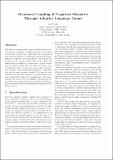Por favor, use este identificador para citar o enlazar a este item:
http://hdl.handle.net/10261/128081COMPARTIR / EXPORTAR:
 SHARE
BASE SHARE
BASE
|
|
| Visualizar otros formatos: MARC | Dublin Core | RDF | ORE | MODS | METS | DIDL | DATACITE | |

| Título: | Structural coupling of cognitive memories through adaptive language games |
Autor: | Steels, Luc CSIC ORCID | Fecha de publicación: | 1998 | Citación: | 5th International Conference on Simulation of Adaptive Behavior (1998) | Resumen: | The paper investigates how a group of distributed agents may develop congruent cognitive memories in the form of networks of prototypes. Memories are congruent if they structure reality in a sufficiently similar way for the agents to cooperate and communicate. Each agent develops his own memory independently of the others and based on his own history of experiences. Agent memories are weakly coupled when the agents are in the same environment. They encounter the same sorts of objects and therefore make similar generalisations. Memories can also be more strongly coupled if the agents communicate and use their cognitive memories to structure and conceptualise reality for communication. The paper explores both types of coupling. Experiments are reported where agents build autonomously internal cognitive memories and develop through self-organisation a shared lexicon that makes their memory more congruent. | URI: | http://hdl.handle.net/10261/128081 |
| Aparece en las colecciones: | (IBE) Comunicaciones congresos |
Ficheros en este ítem:
| Fichero | Descripción | Tamaño | Formato | |
|---|---|---|---|---|
| adaptive language games.pdf | 1,08 MB | Adobe PDF |  Visualizar/Abrir |
CORE Recommender
Page view(s)
165
checked on 23-abr-2024
Download(s)
176
checked on 23-abr-2024
Google ScholarTM
Check
NOTA: Los ítems de Digital.CSIC están protegidos por copyright, con todos los derechos reservados, a menos que se indique lo contrario.
